| Corona Virus
Like many others, FGR people are now working from home as the COVID 19 risk levels have been raised to four and a national State of Emergency has been put in place. We are well set up to work remotely but there will need to be changes to the way we operate and manage our research programmes over the coming weeks.
Other measures which are unavoidable include shifting face-to-face meetings of the various boards and steering committees to remote meetings, and cancelling all face- to-face meetings and workshops. It is likely we will see delays in some research programmes but we are in unchartered waters and we appreciate that, like us, all our research providers and industry partners will be doing their very best to keep things moving forward in these difficult times.
Our contact details are:
Please stay in touch!
New MBIE Funding Proposals
The Forest Research Committee has provided support, including some co-funding support, to four new Endeavour fund applications seeking MBIE funding of some $10 million per year over the next four to five years. These proposals include:
- improving our understanding of the radiata pine microbiome
- sustainable vegetation management in a herbicide constrained environment
- improved ways of predicting erosion risk on steep land
- better understanding of the role improved radiata pine genetics can play in mitigating climate change.
Mechanisation Opportunities in Establishment and Silviculture
An industry workshop in November 2019 involving a range of industry and research people involved in forest establishment and silviculture confirmed that there has been relatively little change in the way labour intensive establishment and silviculture operations have been carried out in New Zealand for 50 years or more.
Workshop participants then discussed possible mechanisation project areas, and a follow-up survey across both large and small growers has enabled us to prioritise these. The responses from large and small growers ranked potential mechanisation opportunities in the following order:
- precision planting including mechanised planting
- precision forestry including smart forest measurement and getting the right tree on the right site
- reducing herbicide usage
- nursery mechanisation.
Large growers ranked mechanised thinning to waste as the top priority with mechanised pruning the lowest priority, whereas small growers ranked mechanised pruning as the highest priority and mechanised thinning the lowest priority.
The next step is to discuss these further with industry representatives and to scope out projects. This involves working through the rationale and potential costs and benefits of the projects as the first step in developing a funding proposal. We had planned to do this via a series of focused workshops but we will now need to rethink how we can get the input we need to further develop this proposal over the next month or so.
New Bioreactors for Tissue Culture Propagation
The new tissue culture propagation project is well underway. Scion has finalised a sub-contract with Georgia Institute of Technology who will be playing an important role in this programme.
An array of ’temporary immersion bioreactors’ has arrived at Scion and is being commissioned. These bioreactors will be used to develop protocols to enable rapid propagation of cell lines of radiata pine more efficiently and rapidly than the current petri dish and gel based systems.
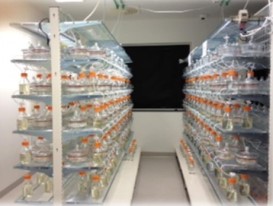 The Twenty First Century Tissue Culture Propagation Partnership (TCP) is a partnership between government (Ministry for Business, Innovation and Employment, MBIE) and industry. It aims to develop a cost-effective and faster means of deploying improved genetics into our forests. The Twenty First Century Tissue Culture Propagation Partnership (TCP) is a partnership between government (Ministry for Business, Innovation and Employment, MBIE) and industry. It aims to develop a cost-effective and faster means of deploying improved genetics into our forests.
The seven-year TCP is an integral part of Forest Growers Research (FGR), and is managed by Russell Burton.
Woodlot Analysis Tool (WATS)
An enhanced version of the Woodlot Analysis Tool (WATS) is now available in the Calculators section on the Forest Growers Research website. Initial user feedback led to a number of improvements, mainly in usability of the tool.
WATS aims to help small forest and woodlot owners establish an indicative value for their forest at harvest, and understand the magnitude of the various factors influencing that value such as harvesting costs, log cartage etc.
Also available is an accompanying updated manual – ‘How to harvest and market your woodlot for profit’ – by Dr Glen Murphy and Prof. Rien Visser. The manual includes two WATS case studies of woodlot harvesting operations.
Find WATS on the FGR website: Woodlot Analysis Tool (WATS)
Fire Research
The Scion Fire Research team have recently completed a series of controlled research fires in the Rakaia Gorge area in Canterbury to test new technology and importantly to gather new data to update fire behaviour and fire spread prediction tools. The project involves collaborations with fire researchers from Australia and the United States.
| BEFORE |
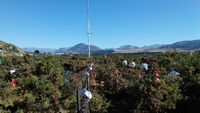 |
| DURING |
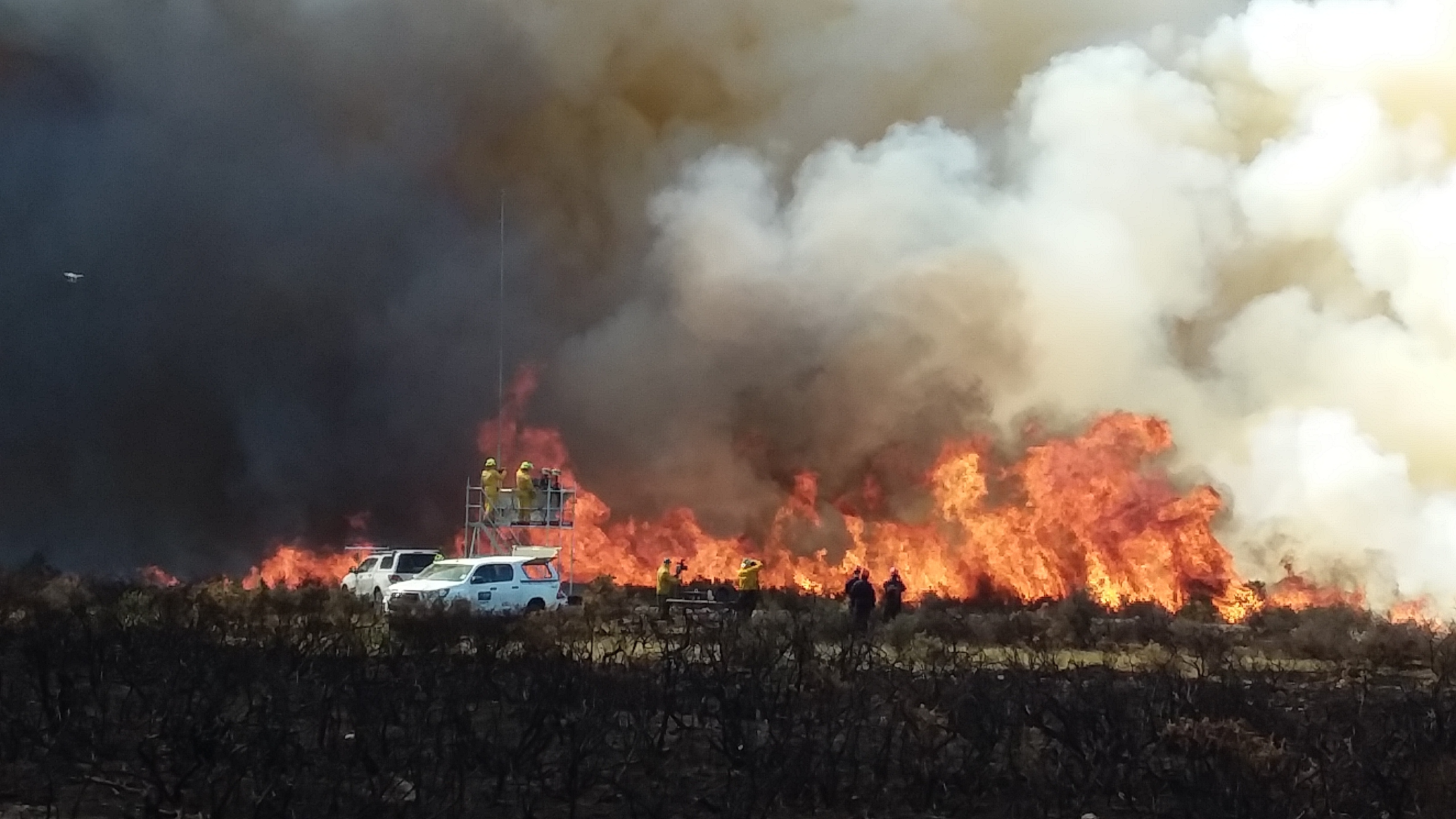 |
| AFTER |
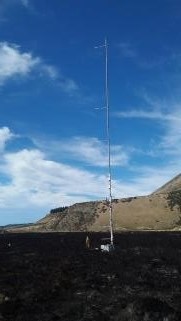 |
Cypress Forestry Strategy for New Zealand
The Specialty Wood Products Research Partnership (SWP) is working to develop a NZ cypress forestry strategy.
Cypress forestry in New Zealand is at a critical juncture, with improved genetic material coming available from long-term breeding programmes, but a decline in cypress planting because of uncertainty around markets and tree health.
Stage 1 of the strategy development process involves:
- consultation with NZ’s forestry harvesting and marketing companies and corporate forest owners to gauge the extent of the cypress resource, levels of cypress management and harvesting activity, and returns being achieved at harvest
- new economic modelling using data from Scion’s C.ovensii permanent sample plots – C. ovensii clonal material exhibiting very promising growth and productivity
- an update of Scion’s cypress research plan.
The completion of Stage One will see a draft NZ cypress forestry strategy produced, and then further consultation with the Working Group to develop a proposed action plan. This should be close to completion by September 2020.
| Young Ovens cypress |
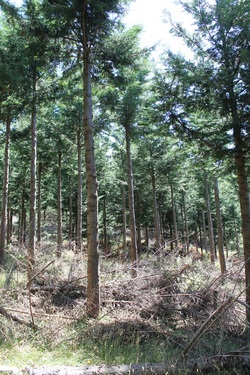 |
| An SWP trial investigating the potential for utilising young, unpruned cypress – 20 year old cypress boards waiting to be edge sawn |
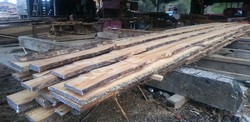 |
The Specialty Wood Products Research Partnership (SWP) is a partnership between government (Ministry for Business, Innovation and Employment, MBIE) and industry. It aims to develop high-value wood products industries based on NZ-grown exotic species which are alternatives to radiata pine. The SWP is an integral part of Forest Growers Research (FGR), and is a seven-year programme, 2015-2022. Marco Lausberg manages the SWP.
An update of recent activities in the SWP programme can be found on the FGR website.
Automation and Robotics
Agreements are now in place for three key projects in the new Automation and Robotics PGP programme:
1. Semi-Automated Motorised Grapple & Tower Hauler Control
This project continues the work started in the Steepland Harvesting PGP programme, to improve grapple carriage control, increase the productivity of grapple extraction and eliminate the use of manual breaking out and unhooking roles through the use of improved grapple carriages. Rosewarne & May Ltd of Whangarei proposed development of a high productivity grapple carriage for use on a tower hauler. A Thunderbird TTY70 hauler is being rebuilt with a hydraulically-activated skyline and a new operator cab for control of the grapple. The project is on target for completion by July 2020.
2. Automated Debarker-Processor
One of the projects in the new Automation and Robotics PGP programme is aimed at improving the handling of harvesting residues, as the current value chain discards most residues once logging is complete.
One solution is to develop a processing head that could also debark trees prior to processing. In this way offcuts would be clean of bark allowing possible further processing into saleable chip or other products. Other benefits of this development include:
- Better log making decisions expected from debarked trees, due to better visibility of log attributes.
- In-forest debarking would reduce the amount of chemical fumigation of export logs. As the China market accepts debarked logs as a risk-reduction treatment, less methyl bromide fumigation would be required at NZ ports.
- Improved truck utilisation with debarked logs than bark-on logs (as 4-5% more wood is transported per truck load).
FGR is working with Waratah NZ Ltd to develop the debarker-processor. A Work Plan has been completed and is in the process of signing.
3. Log Marking And Tracing Technology
A third project proposes a new value chain using an automated log tagging system, at the time the log is made. This will maintain chain of custody of logs and be lower cost than weighing logs and manual log scaling.
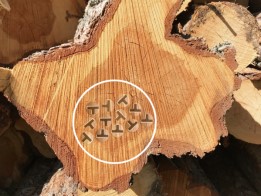 Various individual log identification (Log ID) systems have been investigated and the preferred method is a log marking system similar to the mill stamps that were hammered into the ends of logs in the old days to identify ownership. A new automated system, developed by Otmetka Log Marking AB of Sweden, is to be further developed as part of this project. Logs will be automatically marked with individual log ID as they are processed using the Otmetka Log Marker mounted on a grapple processor head. A work plan for the project has been completed and an agreement with Otmetka for access to the technology is in preparation. Various individual log identification (Log ID) systems have been investigated and the preferred method is a log marking system similar to the mill stamps that were hammered into the ends of logs in the old days to identify ownership. A new automated system, developed by Otmetka Log Marking AB of Sweden, is to be further developed as part of this project. Logs will be automatically marked with individual log ID as they are processed using the Otmetka Log Marker mounted on a grapple processor head. A work plan for the project has been completed and an agreement with Otmetka for access to the technology is in preparation.
A full update of recent activities in the Automation and Robotics programme can be found on the FGR website.
The Automation and Robotics Primary Growth Partnership programme is a partnership between government (Ministry for Primary Industries) and industry that aims to introduce new technology to the log supply chain to improve safety, productivity and to deliver environmental benefits. It is managed by FGR’s Keith Raymond.
Final word from Russell
The Forest Growers Levy Trust has approved funding of over five million dollars for research in their 2020 work programme although many other exciting proposals were not funded due to already somewhat constrained monies available in 2020.
The severe interruption to the Chinese export log market after Chinese New Year due to COVID 19 and now the complete cessation of New Zealand’s harvesting was not expected. These events will result in a significant impact on levy funding in 2020 and we will need to work our way through the implications of this in the coming months. We have already deferred some project funding to 2021 and we will continue to monitor the situation. We know that programmes will be impacted, some significantly, by the shutdown and other business activities being of higher priority to our forest industry partners.
Protecting people and their families over the coming weeks is of utmost priority but we will do what we can to maintain momentum where we can, identify those areas of the programmes that will be delayed, and develop plans to deal with these delays once restrictions are eased. And of course we will also continue to engage and communicate with our stakeholders during these difficult times.
So take care, stay healthy and look after your families and those in your bubble.
Russell Dale
Research Manager |